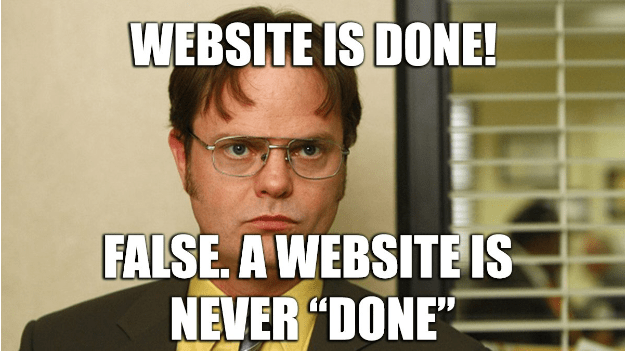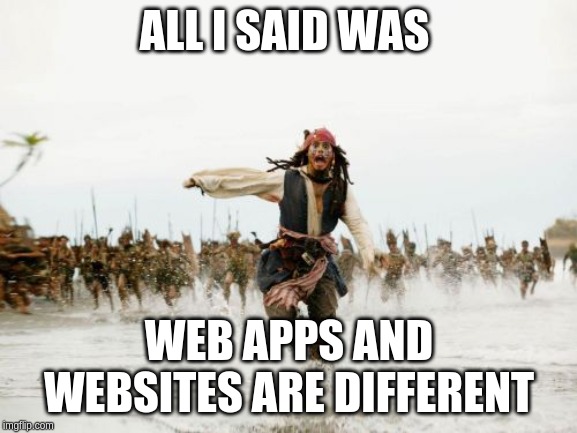Web applications and websites are similar but not the same. There’s a whiskey and scotch kind of difference. All web apps are websites, but not all websites are web apps. Here’s our take on “Website versus Web Application” and what your business should choose? Happy reading!
Many people believe anything that exists out on the internet and can be accessed with a browser is a website. Can’t really blame them! But that’s not true. Websites and web applications are fundamentally different.
Websites are informational. Web apps does little more than provide information. They engage. Let’s first start with describing what these terms stand for and later move on to the difference between them.
What is a Website?
Wikipedia says, a website is a collection of related network web resources, such as web pages, multimedia content, which are typically identified with a common domain name, and published on at least one web server. A little difficult to process, right? Let’s make this easier.
Say you want to know what services an eCommerce company called “A” offers. So, you browse “A’s” website and find what they do, where they are located, their contact information, some case studies, etc. So, you gain a lot of information but you couldn’t order something through the site. This is a website! It’s helping you learn more about the company “A” but you cannot interact with the company in digital terms.
Some examples are Wikipedia, Quora, Reddit, IMDb etc.
What is a Web Application?
Taking another example, again an eCommerce site – you enter, you browse, you pick up a product, you pay for it and buy it. So, apart from information about the company, you could also largely interact with the site.
Put simply, a web application is simply a web site that heavily interacts with the user. Website is a static set of pages that are only informational for the viewer but doesn’t have the capacity of any interaction or communication.
Some examples are Facebook, Amazon, Youtube etc.

Website versus Web App?
.jpg)
[1] Purpose
As discussed, a website is developed keeping in mind that users will gain some valuable information from it. The core business purpose here is information sharing. Every web page is coded in HTML and all the web pages with the same information are visible to all visitors.
In more technical terms, websites require no server-side processing, only client-side.
Web application, on the other hand, means interaction. They are developed keeping the end users in mind. It is not necessary that two users might see the same information on a web app as opposed to a website.
Commenting on a post, reserving a table, booking movie tickets and other sorts of interaction is what web applications are developed for. Developing web apps are a little complicated than website development as it needs to interact with the server-side database.
[2] Interaction
Websites are not interactive. An interactive website is a web application.
In a website, users can view and read or listen to the data. But users cannot modify its functioning.
In a web app, users still get information, but rather than only reading the content, they can also interact with the content and can also manipulate the data on the page. It facilitates users to be highly engaged with the site.
[3] Security
As static websites have no databases involved, the risk of code injection is reduced to a minimal. There are no CMS plugins, Javascript or APIs, so the risks of getting hacked is almost eliminated.
On the other hand, web applications are highly prone to malicious security breaches. Alongside database, plugins, APIs and other dynamic elements, users can also enter their data and get personalized information. So, it has a bigger responsibility to safeguard the data.
Like for example, if your website lets users register or pay, the possibility of SQL injections into site increases. Hire a web development company that knows in detail about the security measures they must take to reduce the potential threats.
At BinaryFolks, to protect web applications against XSS vulnerabilities, we ensure that the pages that are dynamic do not contain undesired HTML tags. We opt for filtering to validate script tags or perform server-side encoding for all scripting tags.
[4] Authentication
Since web applications let people interact with data and store their information, they need authentication. Authentication is when users require a login id and password to access them.
Websites generally can do without authentication as they don’t offer much broader scope of options for the end user. Ex : you have to have a login ID and password to access twitter but you don’t need a login id and password to read articles on Forbes.
[5] Integration and deployment
A web application requires different sorts of integrations – CMS, Payment Gateway, ERP etc. The purpose is to connect multiple applications to create engaging and seamless experiences for the end users.
Both websites and web applications can be integrated with other software but integration is still more typical for the later one.
When it comes to deployment, for a website, the HTML code needs to be updated for small changes. For a web application, all changes require a complete re-compilation and deployment.

When do you need a website? When should you opt for a web app?
The whole idea of what you need – website versus web application, depends on your business needs.
Scenario 1:
You are a charity. You want your visitors to know details like where your charity is, what is the cause, how to donate, how to visit, etc. So, in this case, you want to build a brand awareness and create a social proof. Also, you want to generate some leads. You need a website!
Scenario 2:
You are a car selling website. Your users will have to upload the details, images and access maps, maybe even pay for something. You need to develop a website that can interact with your end users. You most definitely need a web application.
Read more : Why a website or web application development is crucial for any business?
Technologies used to develop websites and web applications:
Website requires HTML, CSS, and maybe a little bit of JavaScript.
Web application needs HTML, CSS & JavaScript, PHP, Python and other frameworks like Django, and CakePHP, etc.
What to keep in mind before developing either of two?
So, now that we are well aware of the difference between website and web application, let me give you some advice before you opt to develop either of them :
[1] Always make your website or web app responsive : 52% of global internet traffic comes from mobile devices. Make sure that your website is mobile-ready because if it’s not and users find it difficult to navigate your site on their mobile, they would abandon it and never look back.
Read more : Does your small business need a mobile app?
[2] Optimize your website or web app for voice search : 50 percent of all searches will be voice searches by 2020. You should have a proper SEO strategy in place to take care of all sorts of verbal search queries.
[3] Speed is one of the most important factors : 1 second delay decreases customer satisfaction by 16%. Convince your visitors to stay in three seconds. Yep, that’s the average opportunity window you have for casual browsers.
[4] Minimalism, that is synonymous with simplicity is a forever trend when it comes to website development : Make sure the website or the web application is easy to surf and is not redundant. Remember, less is more.
[5] Well-Formatted Content That Is Easy to Scan : Because you provide your end users with information about your company or enable them fill up forms and pay, you need to make sure that users can skim through the content instead of reading each and every word from top to bottom. Format the content with this on your mind.
Read more : What To Keep In mind Before Custom Enterprise Software Development?
In conclusion
So, websites and web apps sound similar but are different in the way end users interact with them. If you ask 10 people the difference between website and web application, you might end up getting 10 different opinions. But the baseline for all will be the same – a web app is what lets users control and engage with the site.
BinaryFolks has 8 years of experience in developing both websites and web apps. Let us help you build the future that you imagined!


